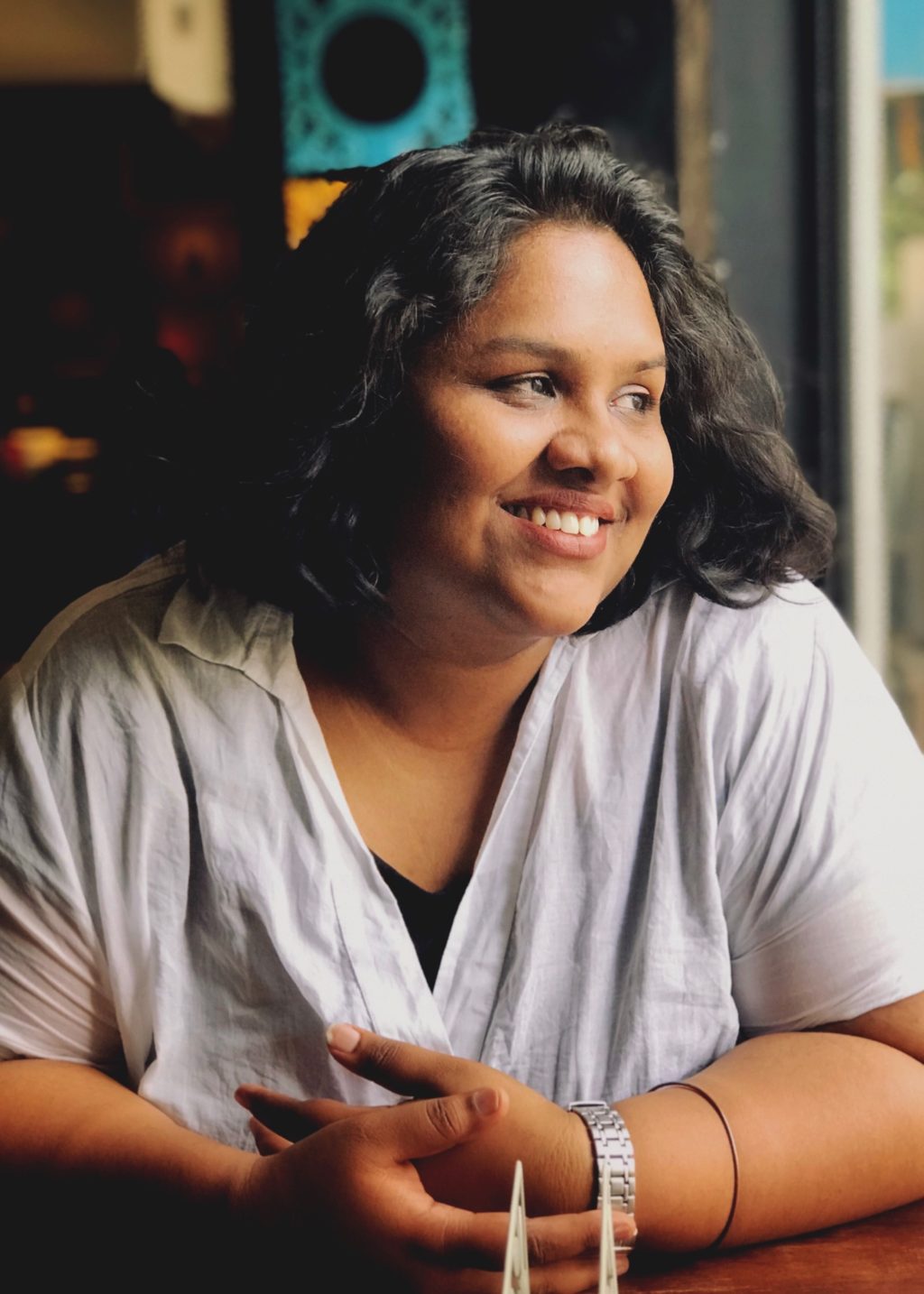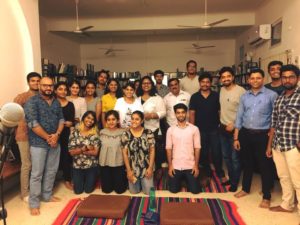If unheard poetry is sweet, those heard are sweeter! If writing is about exploring humanity, then spoken word is one of the most powerful medium of expression. Amalgamating the lyrical craft of poetry with an evocative musical performance, the spoken word feels transient and authentic. Tapping the talent of multitude of artists, MockingbirdsinMadras has curated a wonderful platform for spoken word poets and literature enthusiasts.
Words become more powerful in the communal exchange, when people come together for a singular purpose of listening. It is the atmosphere that spoken word creates, a certain elevation of senses; a dramatic expression of what these words mean to the writer, that makes spoken word sensational. It is for the same reason why writers/authors do exclusive book readings. The agency and function of words does not merely end with the written.
In a free-wheeling chat with Chennai Insider, Michelle Ann James, the enthusiastic co-founder of Mocking Birds in Madras shares some interesting insights about her journey, her thoughts on spoken word poetry and more. Read on to find what’s brewing!
Tell us about the inception of Mockingbirdsinmadras?
On a sunny April afternoon of 2015, we gave birth to Mockingbirds (or rather, Mockingbirds gave birth to us) in a coffee shop in Chennai when a couple of friends gathered to discuss a way to find an audience for their poetry. In a year, it grew into something much bigger, a platform for upcoming spoken word artists and poets to grow. We have been the answer to “Does Chennai really have a spoken word poetry group?” The name Mockingbirds is inspired from To Kill A Mockingbird, Harper Lee’s award winning novel. Our organisation is built on these very lines from the novel,”Mockingbirds don’t do one thing but make music for us to enjoy. They don’t eat uppeople’s gardens, don’t nest in corncribs, they don’t do one thing but sing theirhearts out for us. That’s why it’s a sin to kill a mockingbird”. Our mission is to inspire
self, social and political expression through versification which is essentially what spoken word is about. We had our first event on 19th April 2015 in Chennai. I am an active member from the founding team that is associated with Mockingbirds now. Two other people who are closely associated over the past few years are Ishvar Krishnan and Aashika Suresh.
Why did you want to start such a platform?
There was a clear need in the city for platforms to perform poetry. Open mics are common now, but back then it was a rarity. A bunch of us who scribbled in notebooks and word files had nowhere to present our work. The only other group that did anything with poetry was Prakriti, but that was very seasonal. We saw that there was no dearth of poets in the city but platforms were close to none.
How did you collaborate to set this platform up and running?
Few mutual friends who wrote poetry came together and decided to start a platform to perform their work. That was the set up initially. Slowly the word spread and we reached out through FB, people we knew who would be interested. Initially it was only poetry in English. Later on, Tamil and Hindi poets were added to our community. One of our main ongoing collaboration since 2016 is with IIT Saarang, Chennai. We have conducted workshops, curated poetry performances and aided as resources for their internal literary events. We also collaborate with various cafes and performance spaces around the city to conduct our events.
Why do you think spoken word or poetry is important? Doesn’t someone’s work stop with just writing it?
In the political environment that we are living in, I think spoken word/poetry gives us an access or rather freedom to talk about sensitive issues that we might not be able to discuss in any other platform. It becomes a great platform to make a statement.
The agency of words are clearly not limited to the written word alone. Actually, the spoken word came before the written word. Without the intent we give to the written word, even while reading, it would make no sense. We cannot deny the theatrics of words even while writing. Especially in the case of poetry, terse rhythmic lines are written to read. Why do we go for readings by the author? Why can’t we just read it? Words become more powerful in the communal exchange, when people come together for a singular purpose of listening. It is the atmosphere that spoken word creates, a certain elevation of senses; a dramatic expression of what these words mean to the writer, that makes spoken word sensational. It is for the same reason why writers/authors do exclusive book readings. The agency and function of words does not merely end with the written.
Did you think there would be a good market for spoken word / poetry?
At this point, the city is yet to grow into its full potential when it comes to poetry and spoken word. Slam poetry is still an element in the open mic scene. So the market is not active yet. But there is great potential. Other metro cities have a more active spoken word culture. Hope we can aid in creating such a culture in Chennai.
What makes a good spoken word/poetry according to you?
Well, I give equal importance to performance and content quality. Performance includes the theatrics of a poem; content represents the subject matter itself. If both go in par, a solid spoken word performance can be birthed.
How do you think spoken word scene is compared to other literary movements?
The spoken word movement is quite active in India. Its roots go back to Beat poetry, a sort of rebellious movement that sprung up in the west to oppose the academic poetry that we are taught in schools. But a certain sense of redundancy has set in, in the movement. Lack of written material on spoken word poetry (yes ironic) contributes to a lack of understanding about the movement. It is an extremely fluid and organic space. No clear structure, and hence the ambiguity. Anything goes as poetry these days. In a sense it is true. Poetry cannot be defined.
The movement will definitely pick up in the coming years. Online presence for spoken word is increasing. This has aided in the progress of the movement in India.
What is the plan forward? What’s your vision?
Mockingbirds, at this juncture wants to move from facilitating events to becoming a resource organisation. We want to bridge the gap that scholastic learning of poetry propagates to a contemporary understanding of poetry. We want to take an alternative way of interpreting poetry into educational institutions.
We are also aiming at conducting poetry festivals and retreats. Plans are underway. We also want to do curated events to showcase upcoming poets in the city and develop an online platform for spoken word videos. Plans for publishing an anthology is also brewing. We need sponsors for all this.
What suggestion would you give to an aspiring spoken word artist?
Write, edit, draft, rewrite. Listen to better poets. Read more poetry. Perform at every chance you get. Find a mentor who can give you constructive feedback. Have the courage to send your work to publishing houses. Hone your skills and get better at your craft. Don’t get sucked into the insta poetry phenomenon. Don’t limit poetry to just quotes. Also support local poets, go for their shows. It might not be the best content and spectacular performance, but its indigenous. It is essential that artists support each other.
Know a great story or want to tell us your own? Write to us at content@chennaiinsider.com and we will get in touch with you. For more updates follow Chennai Insider on Facebook and Instagram.


